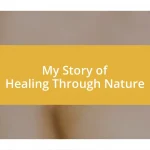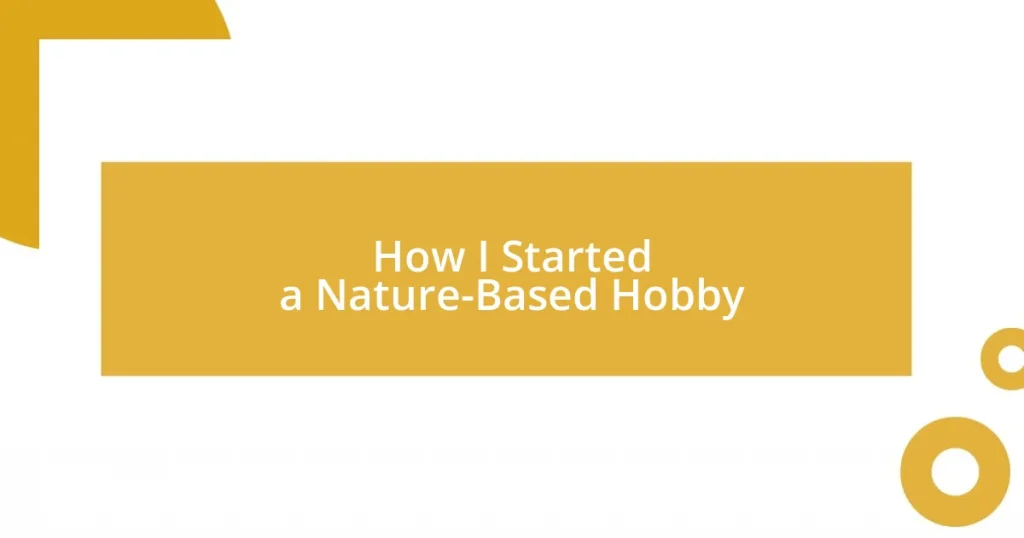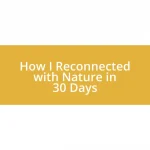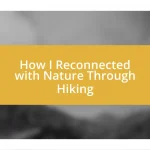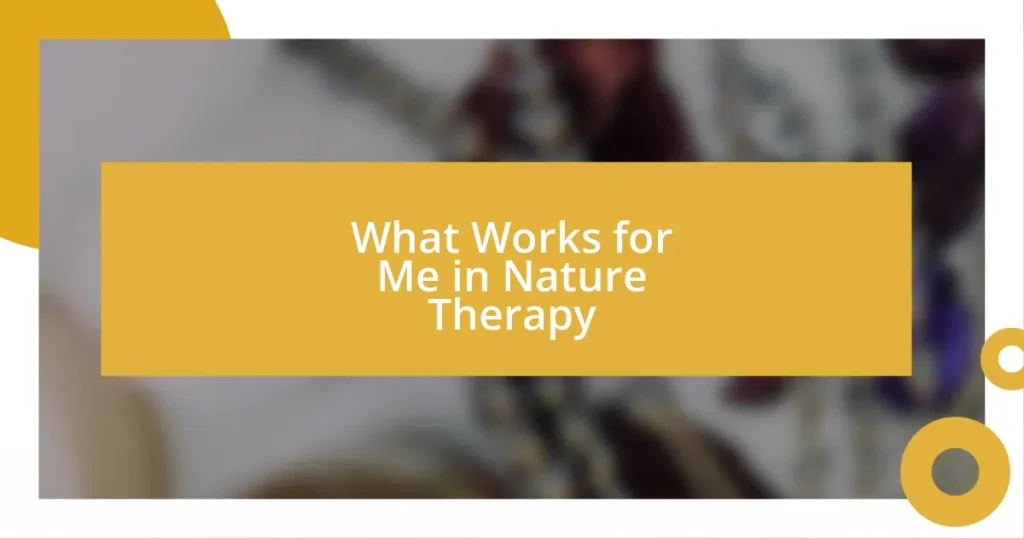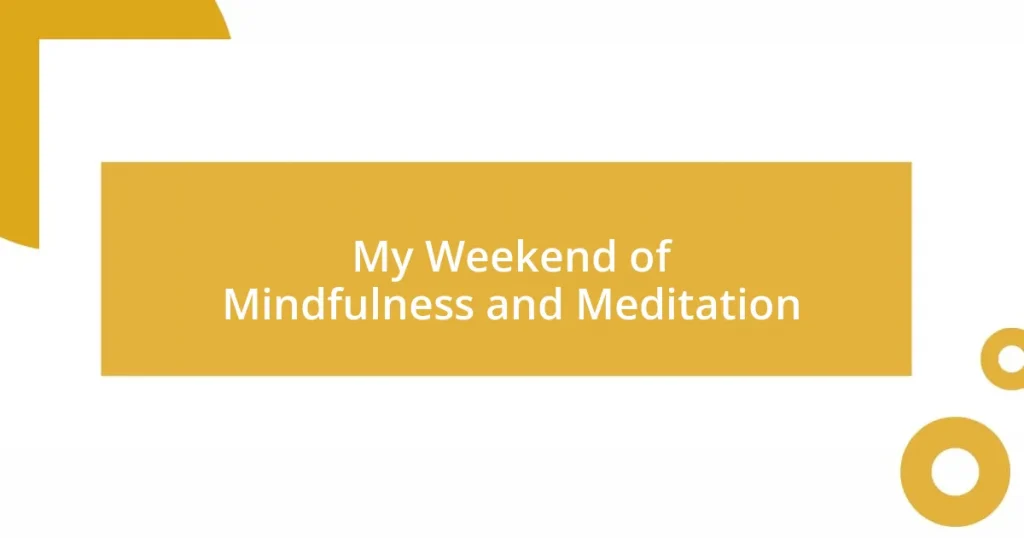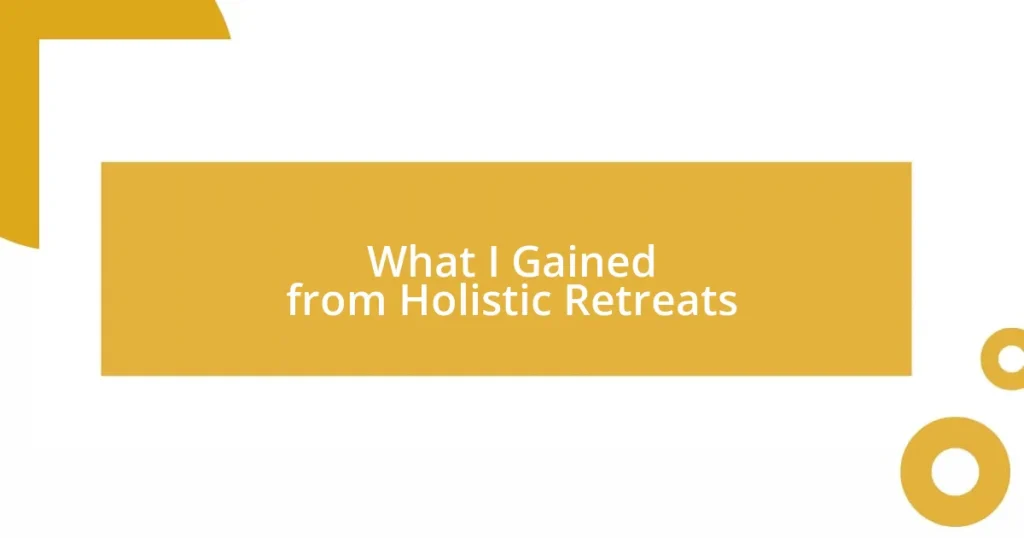Key takeaways:
- Identifying personal interests through reflection and diverse nature experiences can guide choices in nature-based hobbies.
- Setting realistic goals and breaking tasks into manageable steps fosters enjoyment and deeper connections with the hobby.
- Engaging with local resources, such as community gardens and workshops, enhances knowledge and builds supportive networks.
- Establishing a consistent routine aligns personal efforts with nature’s rhythms, leading to more fulfilling experiences.

Identifying Your Interest Areas
When I first thought about diving into a nature-based hobby, I asked myself what truly excites me. Was it the sound of rustling leaves, the thrill of spotting wildlife, or perhaps the tranquility of a peaceful garden? Reflecting on these emotions helped me narrow down my focus to gardening, which has become a rewarding outlet for my creativity and love for the outdoors.
As I explored my options, I realized the importance of immersing myself in different experiences. I remember attending a local nature walk, where I was captivated by the beauty of wildflowers and the intricate details of local plants. It struck me how engaging with nature in diverse ways can illuminate hidden interests in areas you might not initially consider. Have you ever felt a spark of joy in an unfamiliar setting? That’s often a clue pointing you toward your next passion.
Taking the time to journal about my experiences in nature was invaluable, too. Writing down my thoughts and feelings allowed me to track what resonated with me the most. It opened my eyes to patterns, helping me understand that crafting a birdhouse or hiking in serene landscapes brought me the most fulfillment. What about you? Consider what makes your heart race or your spirits lift—those are the areas where your true interests might lie.
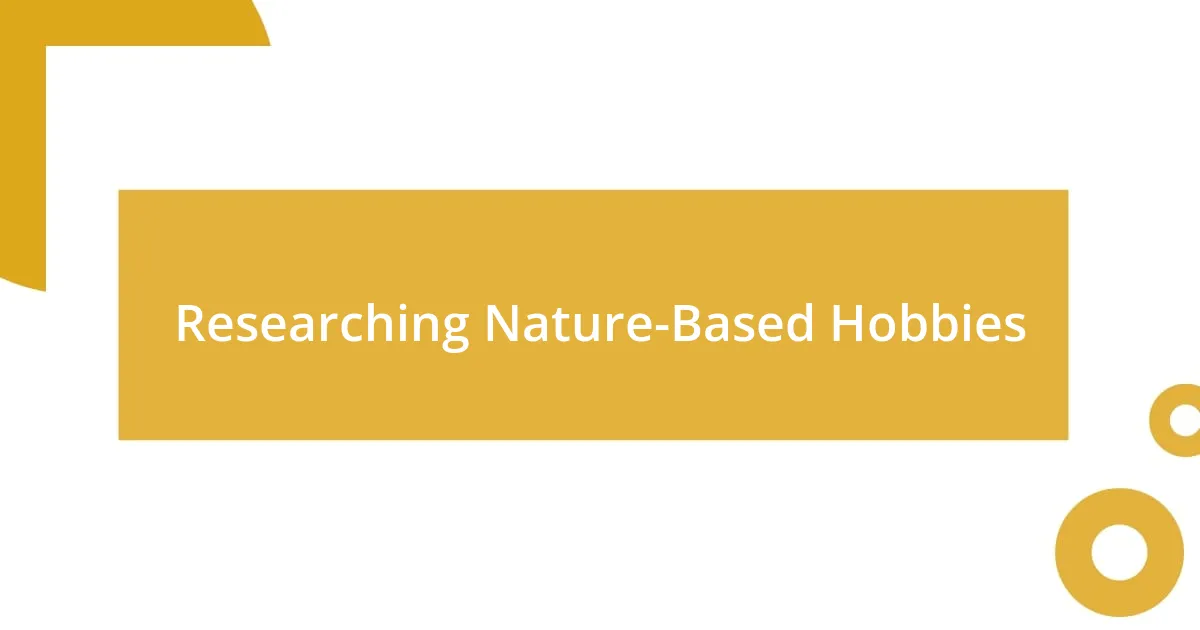
Researching Nature-Based Hobbies
Researching nature-based hobbies can be an exciting journey in itself. After identifying my interests, I turned to various resources like books, websites, and community forums. I remember stumbling upon a nature photography blog that not only showcased breathtaking images but also offered tips to capture the essence of wildlife. This inspired me to delve deeper into the craft, transforming my casual interest into an active pursuit. Have you ever found a blog or article that resonated so deeply it flipped a switch in your mind?
In addition to online resources, I sought out local workshops and groups where I could connect with like-minded individuals. Attending a pottery class that focused on creating nature-inspired pieces was an eye-opener for me. Surrounded by passionate individuals, I found encouragement that fueled my creative spirit. The thrill of sharing ideas and learning together made the hobby feel more dynamic. Have you considered joining a community to enhance your understanding and enthusiasm? It was a decision I didn’t know I needed.
Lastly, I created a short list of hobbies that intrigued me and researched each one. I compared the time commitment, costs, and potential benefits of gardening, birdwatching, and hiking. Initially, I was overwhelmed, but the exercise helped me clarify my priorities. In the end, knowing what to expect made it easier to jump in. What hobbies are you curious about? Sometimes, exploring the possibilities is the best place to start.
| Hobby | Time Commitment |
|---|---|
| Gardening | Moderate – requires ongoing care |
| Birdwatching | Flexible – can be spontaneous or scheduled |
| Hiking | Varies – depending on trail length and difficulty |
| Nature Photography | Moderate to High – training and practice needed |
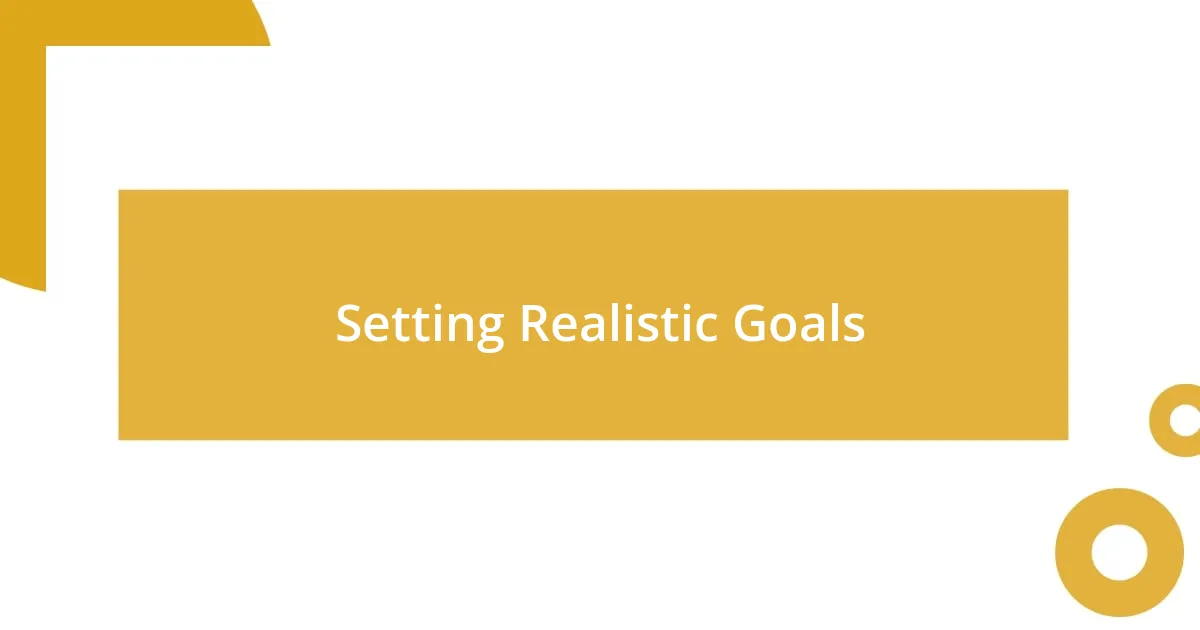
Setting Realistic Goals
Setting realistic goals is essential when embarking on a nature-based hobby. I remember when I first took up gardening—I dreamt of a lush, colorful garden overnight, but reality hit hard. Plants require time and patience. To keep my enthusiasm in check, I learned to set small, achievable milestones. For instance, starting with just a few pots inside allowed me to focus on nurturing each plant without feeling overwhelmed. Recognizing my limits helped me enjoy the process without the stress of lofty expectations.
Here are some tips that I found useful:
- Start with one small project—like a single flowerbed or a herb garden.
- Break tasks into manageable steps to track progress without frustration.
- Celebrate small victories; even a single sprout can be a cause for joy.
- Allow flexibility in your goals; life happens, and plants need care but aren’t set on a strict schedule.
- Set a realistic timeline; maybe decide to achieve a certain goal by the end of the season rather than overnight.
Adjusting my expectations not only made my gardening experience more enjoyable but also fostered a deeper connection with the plants I was nurturing. Embracing the journey rather than just the end result added a level of fulfillment I hadn’t anticipated. What about you? How do you envision setting yourself up for success in your nature-based pursuits?
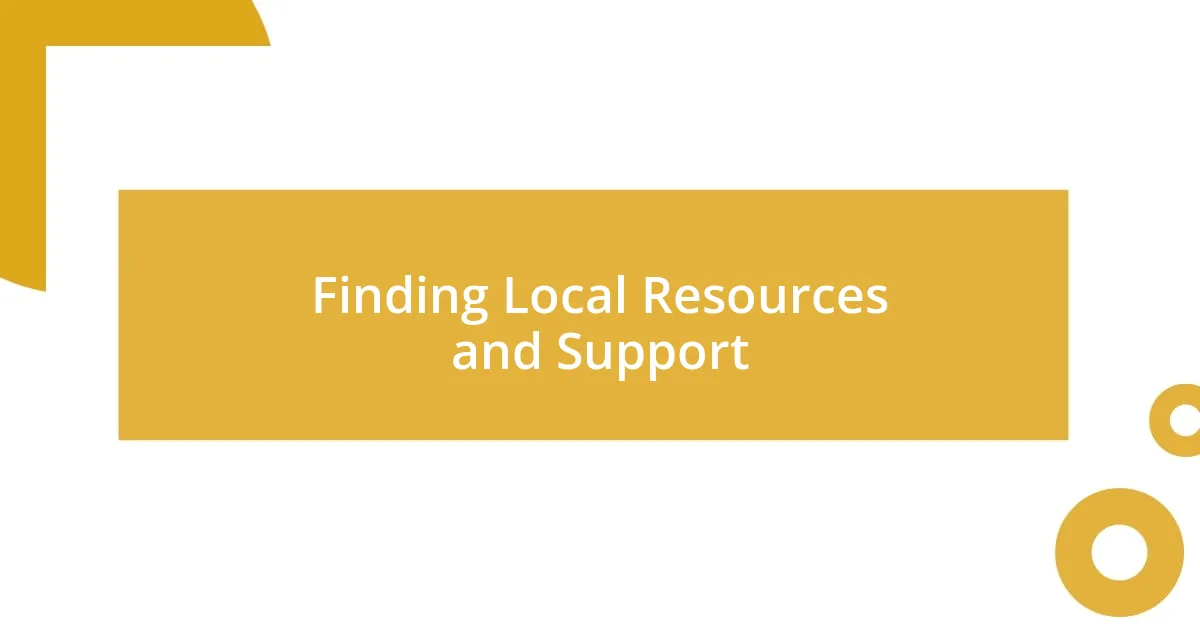
Finding Local Resources and Support
Finding local resources truly enhanced my nature-based hobby experience. I recall my first visit to a community garden; the vibrant colors and laughter among gardeners instantly lifted my spirits. I started chatting with a few members, and to my amazement, they shared tips on organic practices that transformed my understanding of gardening. Have you ever felt that spark of inspiration when speaking to someone who shares your passion?
I also discovered local nature clubs that organized hiking events and birdwatching excursions. Joining one of these outings was like uncovering a hidden treasure trove of knowledge. I still remember my first birdwatching trip, where an experienced mentor eagerly pointed out a bird I’d never seen before. His enthusiasm was contagious, and it reminded me that connecting with others can amplify our learning. What if you explored a local group? You never know who you might meet or what you might learn.
Networking with local experts has been invaluable as well. I once attended a workshop on sustainable gardening led by a local horticulturist. Her hands-on approach fostered an environment of cooperation, and everyone left armed with practical skills and new friends. It changed how I viewed gardening—from a solitary task to an engaging community activity. Have you sought out local experts for guidance? Sometimes, their willingness to share knowledge can pave the way for exciting discoveries and lasting connections.
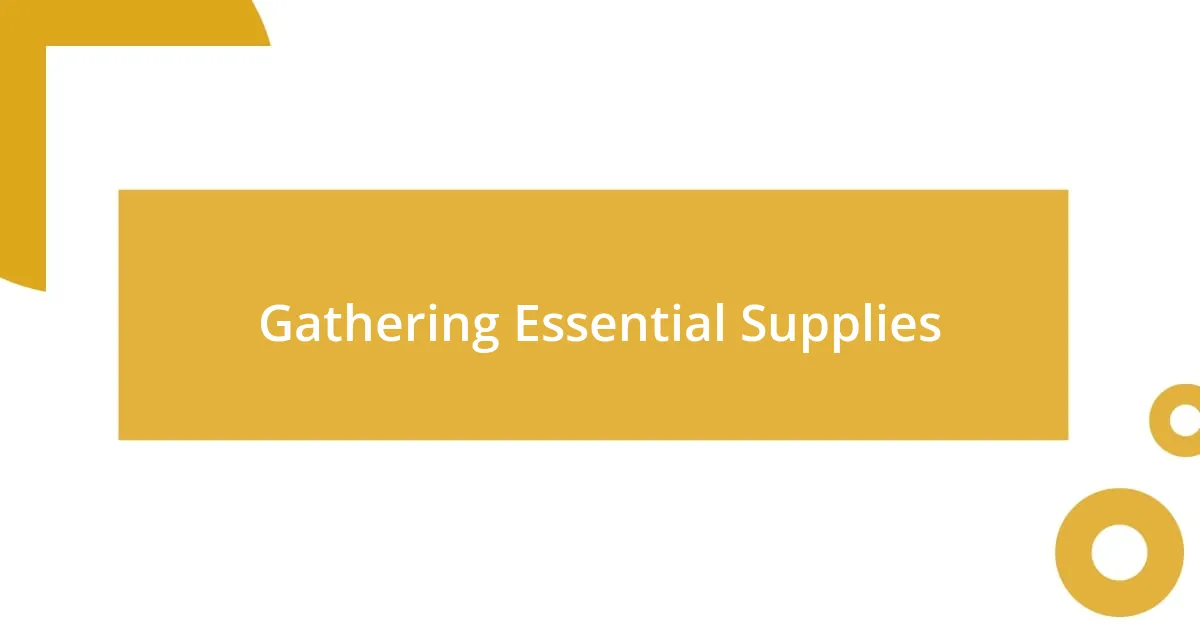
Gathering Essential Supplies
Gathering the right supplies was a game-changer for me when I began my nature-based hobby. I’ll never forget the thrill of my first trip to a local garden center. The bright colors of flowers and the variety of plants left me giddy with excitement. I remember standing in front of rows of tools, feeling a bit overwhelmed. But I focused on essentials—a good pair of gloves, a sturdy trowel, and a watering can. These basics became my trusted companions, and I quickly learned that investing in quality tools made all the difference in my gardening journey. Have you ever felt that rush of anticipation while preparing for a new adventure?
As I delved deeper into my hobby, I discovered additional supplies that were not as obvious. Soil quality became a passion of mine, and I found myself experimenting with different potting mixes. Watching my plants thrive in rich, nutritious soil was incredibly rewarding. I even started mixing my own compost, turning kitchen scraps into black gold that nourished my garden. The sense of pride in using something I created was like a light bulb moment—what you put in truly reflects in what you grow. Have you explored the potential of enriching your surroundings with supplies from your own home?
Lastly, I learned to adapt my supplies based on seasonal changes and my evolving skills. Early on, I found myself overwhelmed by choices, but I began to prioritize what best suited my gardening style and the plants I was nurturing. For instance, I initially bought a wide array of seeds, only to realize that I enjoyed cultivating herbs the most. This shift led me to gather herb-specific pots and tools tailored to their care. Simplifying my collection has not only made my work more efficient but has also deepened my connection to what I grow. What would your journey look like if you focused on what truly excites you?
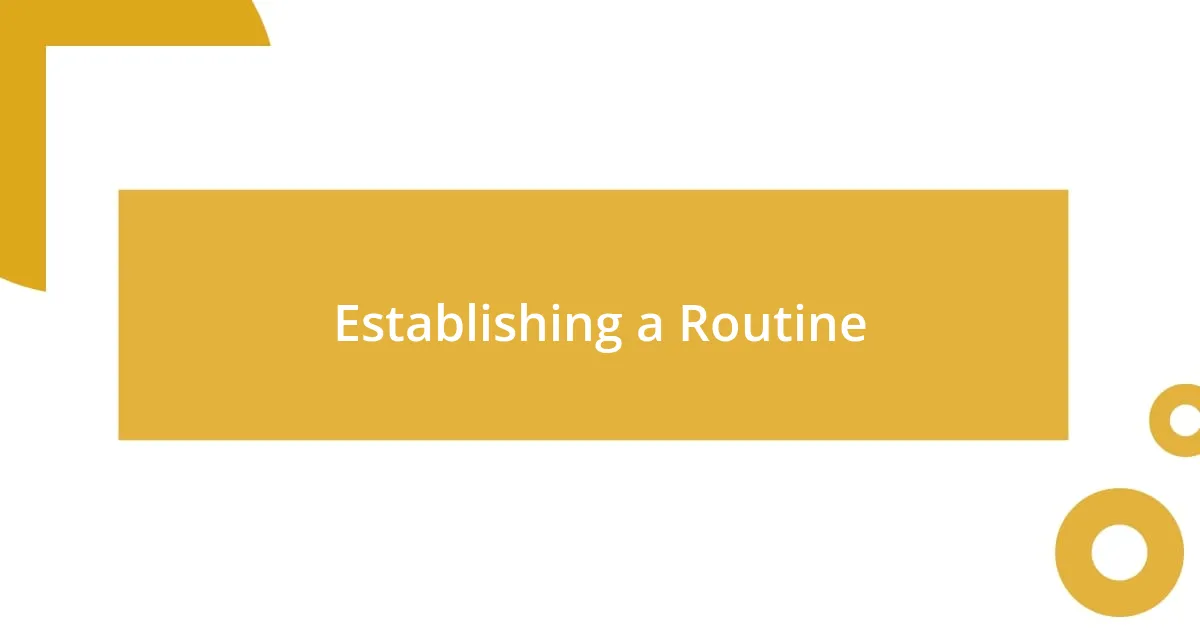
Establishing a Routine
Establishing a routine was crucial for me as I dove into my nature-based hobby. I remember my first early morning ritual, setting out with a steaming cup of coffee in hand and my notebook tucked under my arm. Those quiet moments, surrounded by the sounds of chirping birds and rustling leaves, quickly became my sacred space. Don’t you find that starting your day with a mindful practice can set a positive tone?
I quickly learned that consistency was the secret sauce to improvement. One of my favorite habits was dedicating Saturday afternoons to maintaining my garden. Initially, I struggled to stick to this schedule, but once I committed, I started noticing remarkable changes in my plants. It felt like cultivating not just my garden but a deeper connection to nature. Have you ever experienced that satisfying feeling when your efforts start to bear fruit, both literally and metaphorically?
As the seasons changed, so did my routine, which kept my hobby fresh and engaging. I began incorporating seasonal activities, like autumn leaf collection for composting or spring planting workshops. This not only kept me motivated but also helped me stay aligned with nature’s cycles. I still fondly recall the first time I planted seeds that would bloom in the summer, knowing I was contributing to the vibrant tapestry of my garden. Have you considered how adapting your routine to nature’s rhythm could enhance your experience?








